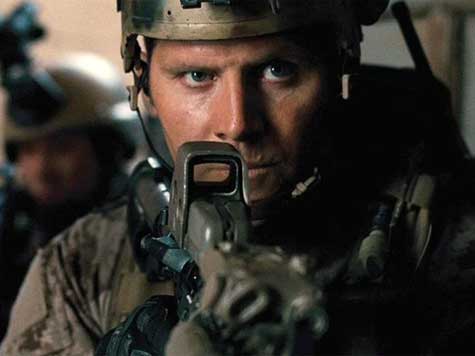Huffington Post reporter Jordan Zakarin has written a piece on the upcoming film “Act of Valor,” set to open this weekend, and it’s not a review so much as a lamentation that the Pentagon would dare assert enough influence to portray American soldiers as the disciplined, sacrificial heroes they are.
The piece opens:
A crack team of highly skilled warriors, outfitted with the most advanced weapons of the world’s most powerful military force, storms an enemy compound, firing round after round of ammunition through concrete walls and the skulls of their terrorist adversaries.
The good guys have yet to suffer a single casualty until, suddenly, one of its leaders takes a rocket to the chest. The audience cringes, but the bang never comes — the rocket clangs to the ground, unexploded, and the battle rages on.
The upcoming film “Act of Valor” is replete with that kind of action, but there are a few things it doesn’t have: There are no corrupt officers, no damaged heroes, no queasy doubts about the value of the mission or the virtue of the cause.
That’s because “Act of Valor” was born not in Hollywood, but in the Pentagon. It was commissioned by the Navy’s Special Warfare Command and its success will be measured not in box-office receipts, but in the number of new recruits it attracts to the Navy SEALs. [emphasis added]
Zakarin, right after quoting the film’s producers state their desire to tell the story of SEALs in the modern day, casually labels “Valor” “the U.S. Armed Forces’ first feature-length recruiting film,” then goes into the history of how “unsuspecting audiences have been treated to Pentagon propaganda at the movies.”
After the war, while Senator Joseph McCarthy waged a campaign against suspected Communists in Hollywood, the military sought to influence the industry with access to technical advice, weapons, vehicles and troops. The Film Liaison Office, established in 1948, was charged with reviewing scripts by filmmakers who wished to use U.S.-issued guns, tanks and ammunition to ensure that they portrayed the armed forces in a suitably positive light.
For nearly two decades, the Pentagon and Hollywood told stories of the Allies’ glorious victory, with John Wayne and friends taking down the Nazis time and time again. By the late sixties, however, filmmakers’ love for the military began to sink like boots in the swamp as the horrors of Vietnam were broadcast nightly to homes nationwide.
From “M*A*S*H” to “Apocalypse Now” to “Platoon,” heroism was supplanted by harrowing portrayals of hopeless, endless brutality. Soldiers coped with drugs, leaders went mad and the government conspired against its own men. Unsurprisingly, those war films, among the greatest of the past half-century, were produced without assistance from the Pentagon.
After establishing cynicism and anti-jingoism as the cardinal virtues of war films, Zakarin then chastises American audiences for the continual flops of “unflattering” modern military-themed pictures, which will allow the big, bad Pentagon to snake its tendrils back around Hollywood’s throat:
Unlike their Vietnam-era forerunners, however, most such films have failed to resonate at the box office — even “The Hurt Locker” made just $17 million in the United States.
With ticket receipts fixed as the north Star guiding Hollywood, those fiscal failures haven’t gone unnoticed. And if the message taken from those losses is that today’s audiences prefer big booms to existential treatises on violence in their war films now, it only help increase the Pentagon’s influence on the industry.
Still, public opinion polls matter to the military more than box office numbers, and by 2007, the military realized it had to shift perceptions to up recruiting for the nation’s two draining, unpopular wars. Bolstered by findings in the 2006 Quadrennial Defense Review, an internal report that set a goal of increasing Special Operations Forces enlistment by 15 percent, the Navy solicited recruiting video pitches from friendly producers.
Depending on how well “Act of Valor” does over the next few weeks, we may see left-wing critics use this line of attack to marginalize and belittle the film. You can’t take a movie seriously if it concludes that our armed forces are populated by honorable men; that’s propaganda, not art. We can also expect a sudden outbreak of hand-wringing over the social effects of a film–how many “unsuspecting” young men will be drawn to recruiting offices by a positive portrayal of Navy SEALs, which wasn’t that much of a factor for the critical discussion of Oscarbait about Palestinian suicide bombers.

COMMENTS
Please let us know if you're having issues with commenting.